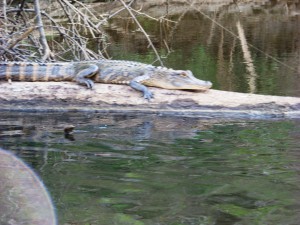The American Alligator is an icon in the state of Florida. Viewed on the program “Swamp People” and as the mascot of the University of Florida, most visitors to our state view this animal more on television than in the wild; but they are certainly there. In need of mates and calories from the lack of eating over the winter, alligators and other reptiles become more active this time of year. Visitors and residents alike should be a little more cautious.
Like most predators, alligators seek food that will provide them energy. Generally predators will target prey that will cost them very little energy to capture and kill. Obviously small alligators will feed on small prey but adult alligators feed on smaller prey than many think. Fish, turtles, snakes, small mammals and birds make up the bulk of their diet. If the opportunity presents itself, and they do not have to expend too much energy, alligators will certainly take larger mammals and birds.
For humans the bigger problem has been the loss of pets and livestock. Small dogs are certainly easier prey than a human, and with the loss of habitat encounters with humans and their pets have increased. Since 1948 FWC has estimated about 300 alligator attacks on humans directly, less than 10% of these were fatal. As more alligators are forced into suburban areas more encounters have occurred. In the last 10 years 16,000 nuisance alligator calls have been reported to the FWC. As with other wildlife, like coyotes, many of these animals are living in ditches and other watering holes where they seek fish and turtles. However if we visit such places, particularly with our pets, these animals may certainly make an attempt to grab them. If you feel an alligator is a nuisance and could be a potential problem you can call FWC at (866) FWC-GATOR; (866) 392-4286). Folks should be aware that FWC does not relocate nuisance alligators, they will be destroyed. Currently FWC issues about 7000 permits for alligator control across the state.
A couple of safety notes if you live near waterways with alligators.
- Do not swim in these locations at night; alligators are more active hunters between dusk and dawn
- Try to discard fish remains after cleaning in another location besides the water; if these locations have a few alligators they will certainly learn this habitat and hang around the boat ramp more.
- DO NOT FEED alligators; help us let visiting tourists know this and that it is illegal in our state. Alligators fed by humans will eventually lose their natural fear of us and this could bring on problems.
These are awesome animals. We should better understand their natural history so that we can exist with them. For more information on alligators in your area contact your county extension office.
- Tips for Bear Encounters this Fall - November 10, 2025
- Pensacola Bay Invasive Species Summer Survey 2025 - November 3, 2025
- Our Environment: Part 24 – Our Changing Climate - November 3, 2025

